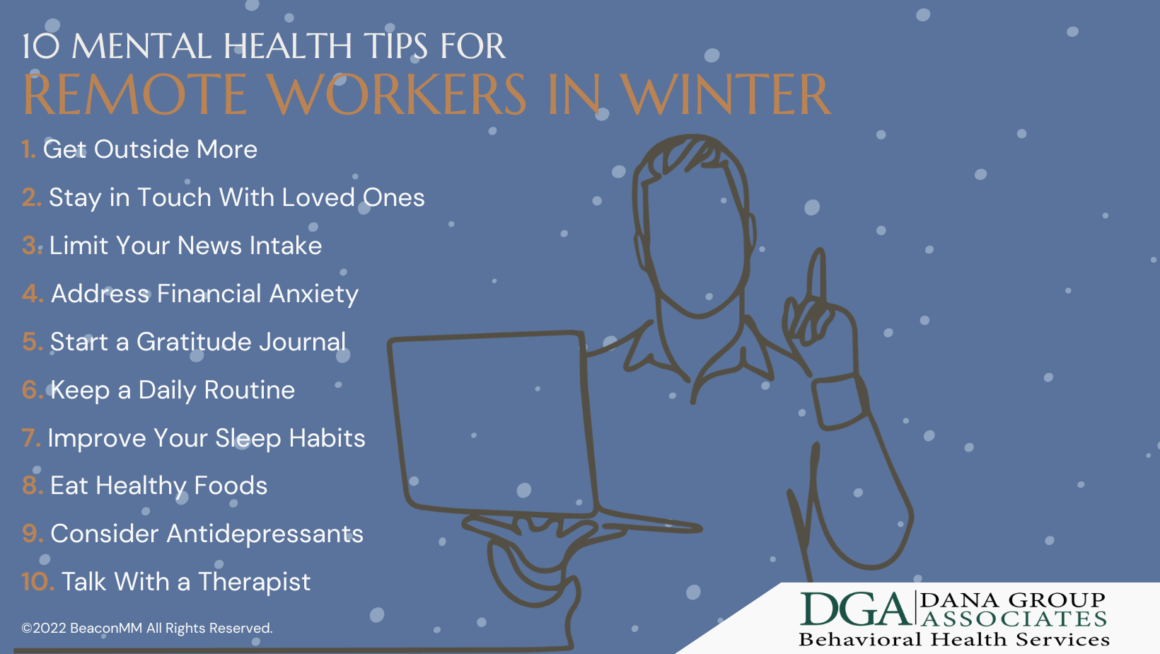Winter often brings poor mental health, whether you have season affective disorder or generally feel blue. If you are a remote worker, you might be even more prone to feelings of depression or anxiety, especially if you spend a lot of time indoors or lack in-person contact. Here are 10 tips to help you improve your mental health this winter season.
Are the winter blues getting you down? Schedule an appointment with one of our professional counselors at Dana Behavioral Health.
10 Winter Mental Health Tips

Why is winter so hard on our mental health? One problem is that there’s less sunlight in the winter. To make matters worse, people tend to stay indoors when it’s cold outside, further reducing their exposure to sunlight. If you have seasonal affective disorder (SAD), this lack of sunlight can affect your serotonin and hormone levels, compounding the depression even more.
Yet, even if you don’t have SAD, depression and anxiety can worsen during winter. If are a remote worker, like many following the pandemic, you probably have less contact with the outside world and fewer person-to-person interactions. The reduced sunlight may affect your sleep cycles, causing you to sleep more, less, or more inconsistently than in other seasons.
Dana Behavioral Health Behavioral Health offers individual, couples, and group therapy to help with problems like anxiety and depression. We invite you to contact us for mental health services. In the meantime, we’ve put together a list of ten winter mental health tips for remote workers.
1. Take a Walk Outdoors
If it’s cold where you live, your reaction to working from home might be something like this: Yay! No more freezing myself to get to work! No more having to clear the ice off my car or shovel the drive every morning!
Those parts might be nice, but staying inside all winter is usually a bad idea. The sunlight is outside, and going out can give you an invigorating mood boost. Bundle up as much as you need to stay safe, but go outside every day you can. You can take part in winter activities like tobogganing, building a snowman with the kids, or ice skating. Or, take a walk, stretch your legs, and enjoy the beautiful winter scenes. You’ll likely feel better soon.
2. Stay in Touch with Friends and Family
As a remote worker, you might find yourself devoting more time and thought to work than when you were going to the office to do your job. Your friends might take a backseat as you focus on the ever-present pressure of unfinished work. Don’t let that happen! Instead, invite friends and family to visit regularly or go out to be with them.
If going out or asking friends to come to you is impossible at any point, you can still reach out to loved ones by calling on the phone or using FaceTime or Zoom. Attending a virtual work meeting is not enough to meet your social needs. Getting in some social interactions every day is one of the most important winter mental health tips for remote workers.
3. Put a Limit on News-Watching
Spending too much time watching the news, scrolling through it on social media, or even reading serious journalistic articles can lead you to depression and anxiety. News primarily focuses on problems, and there are a lot of problems in the outside world. Certainly, you don’t want to hide from what’s happening beyond your home.
On the other hand, viewing too much unhappy news can make you feel angry, sad, or hopeless. Instead, try to take in news in 15-minute sessions. After the time is up, move to something more pleasurable. This practice will not only help you reduce your exposure to things you can’t change, but it will also help you be more selective about the news you do watch.
4. Deal With Financial Anxiety
Many expenses only happen in the winter. For example, you might be surprised by an unexpectedly large heating bill. As a remote worker doing your job from home, you have access to your financial information all day long. You could be working steadily until the mailperson comes and brings bad news like a high bill or a bank statement with a too-low balance.
In our blog, How Do I Stop Stressing about Money, we discuss ways to avoid and reduce financial stress. Some ideas we suggest include:
- Schedule money check-ins rather than constantly poring over your bills.
- Make a budget.
- Develop a strategy to manage your debt.
- Build up an emergency fund.
- Change your mindset about money.
- Practice mindfulness.
When you set aside your financial worries, you’ll be able to work more efficiently and reduce your vulnerability to depression and anxiety.
5. Write in a Gratitude Journal
Gratitude journals are becoming more popular, and there’s a good reason for that. They work! You don’t have to spend a lot of time writing, either. Taking a mere five minutes a day to write down something that made you happy that day can lift your mood. It doesn’t have to be something major. It can be just a short sentence like “I saw a pretty snow-covered tree on my walk today, and it made me happy.” The simple act of writing it down sets that pleasant thought in your mind. As a bonus, you build a store of good memories to reflect on later.
6. Create a Daily Routine
As a remote worker, you might or might not be given a set work schedule to follow. If you can work at the most convenient times, giving yourself a schedule will help you feel motivated and stay on track with your mental health. However, even if you have a set work schedule, it helps to have a routine you follow during your off-work hours. That doesn’t mean you can never be spontaneous, but sticking to important daily routines can ensure you’re taking care of all the tasks on your mental health checklist.
7. Work on Sleep Hygiene
Keeping a steady sleep schedule will help you avoid depression and anxiety. Here are some things you can do to stay on track.
- Nap no more than 30 minutes daily, and never late in the day.
- Wake up and go to sleep at about the same time every day, even if you have to set an alarm.
- Avoid blue spectrum light, such as from computer and smartphone screens, in the evening.
- Don’t eat large meals or drink caffeine or alcohol right before bedtime.
- Keep your bedroom environment dark, quiet, and comfortable.
Getting the right amount of high-quality sleep can help you feel more relaxed and positive.
8. Eat a Healthy Diet
Eating the right amount of healthy foods can be challenging for remote workers. Whatever is in your kitchen is there, and all you have to do is get up from your chair and go get it. You can even munch on snacks as you work. So, you’ll probably be tempted if your pantry is filled with chips and cookies. Therefore, it’s a good idea to stock your kitchen with healthy snacks and eat nutritious foods at mealtimes so that you aren’t so hungry during the day.
On the other hand, you may be someone who gets so focused on work that you don’t take time to grab a healthy snack, cook a meal, or even drink a bottle of water. In that case, you might need to add snacks and beverages to your daily schedule.
9. Consider Antidepressant Medications
If your depression won’t go away by following these winter mental health tips for remote workers, it might be time to consider taking antidepressant medications. Antidepressants don’t help everyone, so they might not be right for you. However, many people benefit from them. It’s best to talk to your mental health provider to find out if they might help you. They can give you information on these medications’ effects and side effects. You can also learn more by reading our blog, Does Medication Help Depression?
10. Talk with a Therapist
Therapy has helped many people worldwide manage various mental health conditions. When you talk to a therapist, it’s not all about venting. You learn about how to cope with any symptoms you’re having and develop a more positive mindset. In addition, your therapist can help you sort out practical problems that are interfering with your mental well-being, such as work pressures and relationship issues. Together with you, we can create strategies and build routines that help you improve your mental health.
How Dana Behavioral Health Can Help
At Dana Behavioral Health, we offer a range of services, including therapy for individuals, couples, and groups. We are committed to making behavioral health support available and easy for you to access. Our team has worked with a diverse clientele for over 30 years, providing assistance with mental health conditions, including depression, anxiety, PTSD, and more.
We offer many modalities of therapy, from talk therapy to music therapy. Our staff comprises true professionals, including psychiatrists, psychologists, and nurse practitioners. Your therapist can also provide you with a more personalized list of winter mental health tips for remote workers. Our goal is to help you improve your behavioral health to have a more satisfying life during this winter and every season beyond it.
Would you like to improve your mental health and have a more enjoyable winter? Contact Dana Behavioral Health to make an appointment for mental health help.
